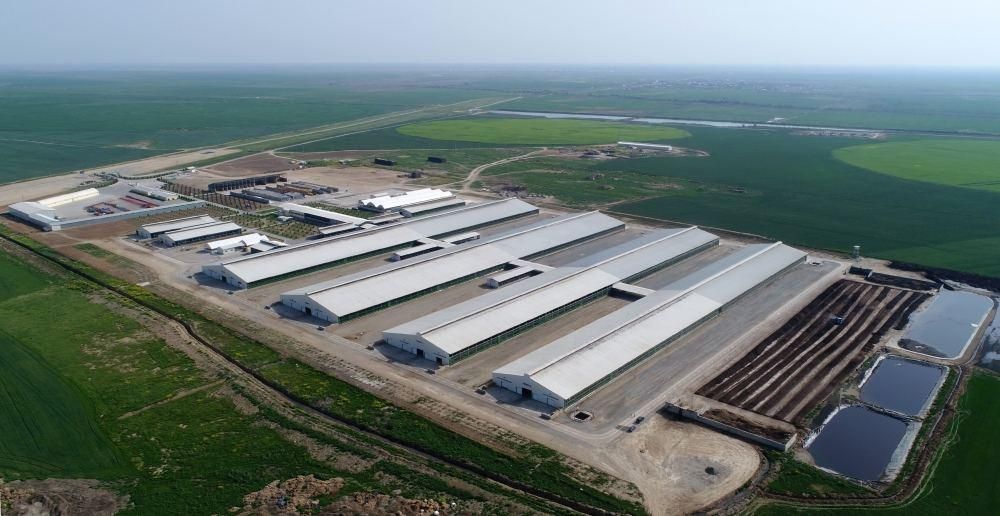Establishing agroparks in Azerbaijan emerges as promising strategy

Azerbaijan, with its rich agricultural heritage and diverse climate, holds significant potential for increased agricultural productivity. Recognising the need to modernise the sector and leverage technological advancements, the establishment of agroparks emerges as a promising strategy to drive sustainable growth and enhance food security. In recent years, the country has turned to innovative solutions such as the establishment of agroparks to modernise its agricultural practices and drive economic growth.
Agroparks are integrated agricultural production zones designed
to consolidate various farming activities into a single location.
These parks typically feature state-of-the-art infrastructure,
including modern facilities for processing, storage, and packaging,
as well as access to essential services such as irrigation, energy,
and transportation. By clustering agricultural activities within a
defined area, agroparks create economies of scale, promote
synergies between different value chain actors, and facilitate
knowledge sharing and innovation.
The establishment of agroparks offers numerous benefits for both
farmers and the wider economy.
In Azerbaijan, the government has recognised the potential of
agroparks as catalysts for agricultural transformation and economic
development. Several initiatives have been launched to establish
agroparks across the country, with a focus on key agricultural
regions such as the Shaki, Zagatala, Goychay, and Imishli
districts.
These agroparks leverage Azerbaijan's diverse agro-climatic
conditions to cultivate a wide range of crops, including fruits,
vegetables, grains, and medicinal herbs. Additionally, specialised
parks dedicated to livestock farming, aquaculture, and greenhouse
cultivation have been established to harness the country's
comparative advantages in these areas.
Recently, in accordance with President Ilham Aliyev's task to
accelerate the development of the non-oil sector and apply
intensive technologies in the agricultural sector, the creation of
agroparks has been started in Azerbaijan.
By politically and materially supporting the creation of agroparks,
which are considered modern farms in all respects, Azerbaijan aims
to meet the domestic food demand entirely through local production,
and at the same time, to increase the volume of our products to be
exported to foreign markets.
Work is currently underway to create 24 agricultural parks on an area of 66 thousand hectares in 22 regions of Azerbaijan. 22 agroparks are functioning on an area of 58.6 k hectares, and construction and installation works are underway in two agroparks. Moreover, 6 agroparks specialise in livestock farming, 6 in horticulture, 11 in agriculture, and one in sorting, packaging, and logistics. The total project cost of the agroparks is AZN 1.2 bln.
In addition, state support amounting to AZN 147 mln has been provided for the establishment or expansion of this business field. To date, the Entrepreneurship Development Fund under the Ministry of Economy of Azerbaijan has allocated soft loans worth AZN 131 mln for the establishment of 18 agroparks, which have been issued documents to stimulate investment, have received benefits worth AZN 16.1 mln.
It should be noted that the Agency for Development of Economic Zones was established as a state legal entity on the basis of Sumgayit Chemical Industrial Park LLC by Decree No. 1257 of the President of the Republic of Azerbaijan, Ilham Aliyev, "On Measures to Improve Management of Industrial Parks, Industrial Districts, and Agroparks," dated January 22, 2021.
But how will all these projects have an effect on the non-oil sector, especially agriculture? What steps should be taken in this field?
Economist Elshad Mammadov said Azernews that that the development of agriculture in the country can greatly support the growth of the non-oil non-mineral sector.
"The main problems in these areas are related to the lack of investment. There is a need to sharply increase the volume of investments. The country needs an effective application of the investment, innovation model. We need to increase the volume of investments on the one hand. At the same time, it is necessary to increase their effectiveness and increase the share of innovative approaches within investments. Because innovation is the driving force of the economy."
According to him, innovations, scientific and technical progress constitute the main part of economic growth.
"I think that investment policy aimed at implementing new innovative approaches in these directions, increasing investment, should be a priority for the government in the country, including the development of the agricultural sector. For the increase of investments, opportunities should undoubtedly be created for access to credit resources, i.e., the main source of investments, and accessibility should be ensured."
"If we focus on the development of agriculture in innovative areas, then we should consider that the payback period for funds in high value-added, high-tech areas is longer, which means that long-term, as well as accessible credit resources should be available. This also means that we should allocate more resources to the implementation of complex technological solutions. Complex technological decisions are long-term directions, which means that we should offer accessible and long-term credits to entrepreneurs. Because the lack of accessible long-term credits significantly limits the capabilities of entrepreneurs,” the expert underlined.
---
Follow us on Twitter @AzerNewsAz
Here we are to serve you with news right now. It does not cost much, but worth your attention.
Choose to support open, independent, quality journalism and subscribe on a monthly basis.
By subscribing to our online newspaper, you can have full digital access to all news, analysis, and much more.
You can also follow AzerNEWS on Twitter @AzerNewsAz or Facebook @AzerNewsNewspaper
Thank you!

